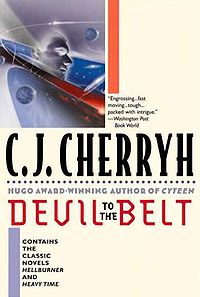Cherryh has been writing the Union-Alliance books since Downbelow Station in 1981. They’re a series of standalone novels within a shared universe. The major characters from one book may be seen briefly in another book, but you don’t generally need to have read any specific book to understand any other book in the series. Cherryh delights in turning the reader’s brain inside out anyway, so there are books from all kinds of points of view, and one book may make you sympathise with characters and positions that other books made you detest. I regard this as a major achievement and part of what makes Cherryh a great writer.
In internal chronological order, the series begins with the duo Heavy Time (1991) and Hellburner (1993) (published in one volume as Devil to the Belt, 2000), and that’s where I’m beginning my re-read. I’m not sure I’d recommend this as a place to start, not because you need series knowledge to follow them—you definitely don’t—but because Heavy Time is so relentlessly grim. Cherryh is seldom a barrel of laughs, but Heavy Time is grim even for her. Most of her books are a lot more fun than this. Yet if you did read them first, they might not seem so grim, because a lot of what makes them grim is the inevitability of what’s coming, which you only know from the other books. After all, there’s a definition of tragedy as a story where you know the end.
Unlike most Union-Alliance books, these are a pair, concerning the same characters, and should be read in order. Also unlike the others, they are set in the solar system. We don’t see much of Earth, but this is as close to it as we ever get in these books.
The asteroid belt crawls with miners all hoping for a big strike that’s going to make them rich, but the Company grinds them down worse each year. In Heavy Time a couple of prospectors pick up a ship that’s sending a distress signal and complications ensue. Ben and Bird just want to get a bit ahead and Dekker just wants to fly, the Company just want to screw everyone over, and the Fleet just want recruits with the kind of reflexes you can get from being an asteroid miner. In Hellburner our protagonists—those who survived Heavy Time—are in the Fleet and hoping to get along until they get involved with trials of a prototype rider-ship.
If Cherryh were a weaker writer, if she didn’t make the characters and the places of her novels so real, it wouldn’t matter that these books are intensely claustrophobic, and that Dekker is on the edge of crazy for most of the time you spend in his head.
These are great feminist novels. There are women in them who succeed on their own merits and yet are questioned because they are women. They’re not in a magically non-sexist future. They’re accused of making it by “whoring around on Helldeck,” to which one of them replies, “You a virgin, Mitch? Didn’t think so.”
It’s also a terrific future. All the details hang together. Asteroid miners being screwed by the Company is somehow more realistic than the scenarios of asteroid miners SF usually offers. And in the background negotiations going on in Hellburner you can see the beginnings, if you know what’s coming, of the long betrayals that are up ahead. Cherryh’s future history really has the texture and grain of history, and the books feel to me very much like historical novels. Yet on a series re-read when you know what’s coming, they also have history’s inevitability.
Both of these books have ends that approximate happy endings, and if you were to read them without knowing any more about the universe, they could be read as happy endings. At the end of Heavy Time, being drafted comes as a relief, an escape from problems in the Belt. At the end of Hellburner the immediate problems have been solved and it looks as if everything is going to be all right.
These are happy endings to compare with the Albert Finney film version of Churchill’s The Gathering Storm, in which the happy ending is that World War II starts. I think you’re assumed to know about the implicit happy ending of WWII. But it’s still a long way off from September of 1939. It’s even worse here, where the end of the War is a quarter of a century away, and even then it isn’t good for the Fleet. Still, Cherryh artfully stops the books at points where we can feel reasonably positive, if we lack foreknowledge, and that’s really very clever of her.










